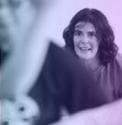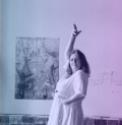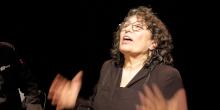My joy is unbroken
Brigitte Cirla reflects on her journey with the Magdalena Project from its beginnings in 1986. This article was written in 2022 and is published in the "Women Performing Europe - The Magdalena Project Across Borders" handbook.
There are so many different stories to describe the Magdalena Project, and telling this adventure from here in 2022, is always a way of rewriting and reinterpreting this story.
Several things stand out to me strongly: we were all from the same generation, we were all in alternative theater/music groups, we were all becoming professionals, and we all felt we were alone in the face of a silent and denied social injustice. We were crossed by all these questions concerning our place as an artist, as a woman, as a mother, in front of an unbeatable glass ceiling, we did not have the listening or the support of our partners or colleagues because no one understood what we were experiencing, intimately, and we ourselves didn’t necessarily have the words.
 I have often said that it was rage that had founded the Magdalena Project and that there originated its profound necessity. It is inaccurate, it was not just that, there was also an appetite for creation, for work, an enormous desire to work, to create, to make one’s place, to find the means, to live from one’s work, to present one’s works. And the task for each, alone, was superhuman. Meeting each of us was groundbreaking and gave us immeasurable energy; I remember being amazed to realize that my concerns, my discrepancies were not only mine but those of women artists in general.
I have often said that it was rage that had founded the Magdalena Project and that there originated its profound necessity. It is inaccurate, it was not just that, there was also an appetite for creation, for work, an enormous desire to work, to create, to make one’s place, to find the means, to live from one’s work, to present one’s works. And the task for each, alone, was superhuman. Meeting each of us was groundbreaking and gave us immeasurable energy; I remember being amazed to realize that my concerns, my discrepancies were not only mine but those of women artists in general.
The times were different, it was not glamorous to defend feminist issues, even with our partners, our directors and our audiences ... it was not commercially beneficial either, not in fashion, it was complicated and it projected us even further to the margins of the alternative system. It is important to realize this because the theoretical reflection, the putting in words, the writing, the putting in perspective only came in a second time, after the creation of the Magdalena Project.
We had to think about what we were groping for, without model, without reference, and there we discovered the discussion, the confrontation, all the differences we had, the importance of cultural antagonisms, the semantic value of a word, the symbols so different for each, we discovered how much what seemed obvious and simple to us, could be problematic for the other … and in these meanders of communication, we sought and found how to continue together, how to carry a project without agreeing on everything and even sometimes without agreeing at all.
Because what carried us, what united us, was vital for us, and essential and there was no other option, no other alternative to carry our voices.
We who were speechless, without words, without speech, without recognized legitimacy, have gradually learned, first to listen to each other, then to let each other speak. We no longer wanted any words to be silenced or repressed, and we had to let out waves of logorrhea. At that time, the «Round» appeared, a circle that gives the floor for a specific time to each without comment or interruption. It is an exercise that seems surreal today, because it is long, it takes time, it immerses most people in listening to others and in listening to the echoes made by the words of others. It curbs emotional reactivity and allows thought to unfold. But it is also a radical way of giving everyone a voice, especially those who would not have allowed themselves to do so.
Then came the necessity of writing, and it was The Open Page, a journal that asked artists to move on to the written word, to leave traces, stones on the path that others could consult. The Open Page was one of the important means of exploring this work of thought, of reflection on our art, our place, our lives.
The other founding principle of the Magdalena Project is "do it". We started with this, without really thinking; Jill Greenhalgh proposed a meeting of 38 women from 15 countries for three weeks in 1986 to also create a laboratory/show together without leading. It seemed incoherent and impossible but behind this bet, everyone went to work for three weeks and it was never discussed.
 One of the things I learned in the Magdalena Project is the commitment to create, to work, to do. I know, as an artist, that I have to set foot on the set physically and search with my body and my voice to trace the threads of the beginning of a creation. We did the same with Magdalena, we used the creative tools we knew to grow this network, with the deep conviction that the solutions are always found in the process of construction or creation.
One of the things I learned in the Magdalena Project is the commitment to create, to work, to do. I know, as an artist, that I have to set foot on the set physically and search with my body and my voice to trace the threads of the beginning of a creation. We did the same with Magdalena, we used the creative tools we knew to grow this network, with the deep conviction that the solutions are always found in the process of construction or creation.
The themes chosen for meetings, festivals, workshops always came from our obsessions and questions. Friendship, respect, fidelity, benevolence are born of shared tasks and have grown with projects, difficulties, time. Anyone who has ever come to a Magdalena festival has always said the same words: "it is different from other festivals."
There are several principles of difference that have emerged from practice as evidence:
Having participated in several festivals (at least 2) before creating an event themselves, the guest artists come for the entire duration of the festival, workshops, and shows included and not only for the performances, the importance of transmission, workshops, discussions and always a space for work in progress, risk-taking.
One of our greatest strengths is the exponential power of contamination rather than the capacity for conviction or persuasion. The women who come to a Magdalena meeting choose themselves to create other meetings in their own country. That is how the Magdalena 2nd, 3rd and even 4th generation were born and that other projects develop that completely escape the initial seed.
At the beginning, Magdalena is the creation of a generation of women, greedy and impatient who did not want to wait for a place and decided to create it and support each other. This generation has often developed its artistic work through long learning processes and of "craftsman at work" traditions, the awareness that creative work is slow, laborious and requires years of uninterrupted practice, that the path is paved with pitfalls and failures, and that nothing is due.
We didn't have social networks, the internet, or even cell phones, so the need to be in touch was imperative. We had to meet at all costs and I remember the importance of the waiting time for these meetings, the preparation time but also the time to digest what had been said, seen, felt, exchanged.
Everything has changed and nothing has changed. Women artists still have to fight twice as hard to find their place today. There is more audience and echoes given to our words but they are often drowned in the incessant flow of emotional comments and spontaneous and ephemeral statements. Magdalena remains a special place, of risk-taking and yet protected, of discovery, of listening, of meeting and of commitment.
Of this generation of thirty years old, we have become the grandmothers: unwise, always rebellious, always enthusiastic, more impatient than ever because time is running out for us now.
I discover a new injustice, that of my age, this place that I conquered, rehearsal after rehearsal, I am proposed to leave it for the "young people". More politely, I am offered to rest! I am not tired of creating, of "doing", of meeting, of exchanging and I even believe that along the way, I have discovered some nuggets.
There is a conformism in our society which would like to confine seniors to transmission and teaching as if the source of creation could no longer exist. I believe it's the exact opposite. Of course, there is transmission, but it has always been there, alongside and nourished by the act of creation.
What can be transmitted is the “joy” of doing at all costs, “the joy” of joining forces with others, not similar but with the same urges, “the joy” of trusting one's desires, and of never giving up. Obstinacy seems to me to be the most necessary quality today for those who take on these still unresolved questions, woman/artist/mother/private/public/ and I will add the artist and "the splendor of ages" (title of the 2022 Transit Festival).
Brigitte Cirla
2022




